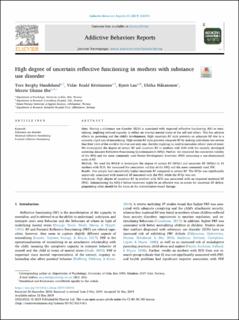High degree of uncertain reflective functioning in mothers with substance use disorder
Peer reviewed, Journal article
Published version
Permanent lenke
https://hdl.handle.net/11250/2650928Utgivelsesdato
2019Metadata
Vis full innførselSamlinger
Sammendrag
Aims: Having a substance use disorder (SUD) is associated with impaired reflective functioning (RF) or mentalizing, implying reduced capacity to reflect on internal mental states of the self and others. This has adverse effects on parenting and the child's development. High uncertain RF style prevents an adequate RF due to a concrete, rigid way of mentalizing. High certain RF style prevents adequate RF by making individuals too certain that their view of the world is the true and only one, thereby implying no need to mentalize others' state of mind. We investigated the degree of certain RF and uncertain RF in mothers with SUD with the recently developed screening measure Reflective Functioning Questionnaire-8 (RFQ). Further, we measured the concurrent validity of the RFQ and the more commonly used Parent Development Interview (PDI) measuring a one-dimensional scale of RF. Methods: We used the RFQ-8 to investigate the degree of certain RF (RFQc) and uncertain RF (RFQu) in 43 mothers with SUD. We measured the concurrent validity of the RFQ and the more commonly used PDI. Results: Our sample had considerably higher uncertain RF compared to certain RF. The RFQu was significantly negatively associated with maternal RF measured with the PDI, while the RFQc was not. Conclusion: High degree of uncertain RF in mothers with SUD was associated with an impaired maternal RF (PDI). Administering the RFQ-8 before treatment might be an effective way to screen for uncertain RF deficit, pinpointing what should be the focus in the mentalization-based therapy
Beskrivelse
© 2019 Published by Elsevier Ltd. This is an open access article under the CC BY-NC-ND license (http://creativecommons.org/licenses/BY-NC-ND/4.0/).

